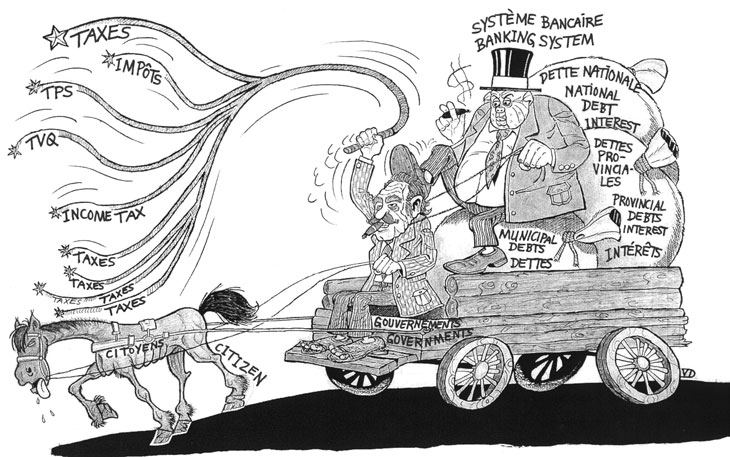|
Chapter 9 The Monetary Defect The
situation amounts to this inconceivable thing: all the money in
circulation comes only from the banks. Even coins and paper money come
into circulation only if they are released by the banks. But
the banks put money into circulation only by lending it out at interest.
This means that all money in circulation comes from the banks and must
be returned to the banks some day, swelled with interest. The
banks remain the owners of the money. We are only the tenants, the
borrowers. If some manage to hang on to their money for a long time and
even permanently, other people are made incapable of fulfilling their
commitments. A
multiplicity of personal and corporate bankruptcies, mortgages upon
mortgages, and the continuous growth of the public debt, are the natural
fruits of such a system. Charging
interest on money at birth, as it comes into existence, is illegitimate
and absurd, antisocial, and contrary to good arithmetic. The monetary
defect is therefore as much a technical defect as a social defect. As
our country grows, in production as well as in population, more money is
a must. But it is impossible to get new money without contracting a
debt, which collectively cannot be paid. So
we are left with the alternatives of either stopping growth or going
into debt; of either plunging into mass unemployment or of having an
unrepayable debt. And it is precisely this dilemma that is being debated
in every country. Aristotle,
and later, Saint Thomas Aquinas, wrote that money does not produce
offspring, does not breed more money. But the bankers bring money into
existence, provided only that it breeds more money. Since neither
governments nor the public create money, no one creates the offspring
(the interest) claimed by the banker. Even legalized, this form of issue
remains vicious and insulting. Decline
and degradation
This
way of creating our country's money, by putting governments and
individuals in debt, establishes a real dictatorship over governments
and individuals alike. The
sovereign government has become a signatory of debts owed to a small
group of profiteers. A minister, who represents all of the population of
the country, signs unrepayable debts. The banker, who represents a few
shareholders who thirst after profits, manufactures our country's money. This
is one striking aspect of the degeneration of power, of which Pope Pius
XI spoke: governments have surrendered their noble functions, and have
become the servants of private interests. The
Government, instead of guiding Canada, has become a mere tax collector,
and the biggest item in government expenditures is precisely debt
servicing: payment of the interest on the public debt. Furthermore,
legislation consists mainly in taxing the citizens, and erecting,
everywhere, restrictions to freedom. There
are laws to make sure that the money creators are repaid. There are none
to prevent human beings from dying in dire poverty. Tight
money develops a mentality of wolves in individuals. In front of plenty,
everyone tries to get the too scarce symbols of the goods that give a
right to a share in this plenty. Hence, frantic competition, patronage,
denunciations, the tyranny of the boss, domestic strife, etc. A
handful of people preys on the others; the great mass of the people
groan; many founder in the most degrading poverty. Sick
people remain without care, children are poorly or insufficiently
nourished, talents go undeveloped, youths can neither find jobs nor
start homes and families, farmers lose their farms, industrialists go
bankrupt, families struggle with difficulties all this without any
other cause than the lack of money. The banker's pen imposes privations on the public and servitude on the governments.
|
